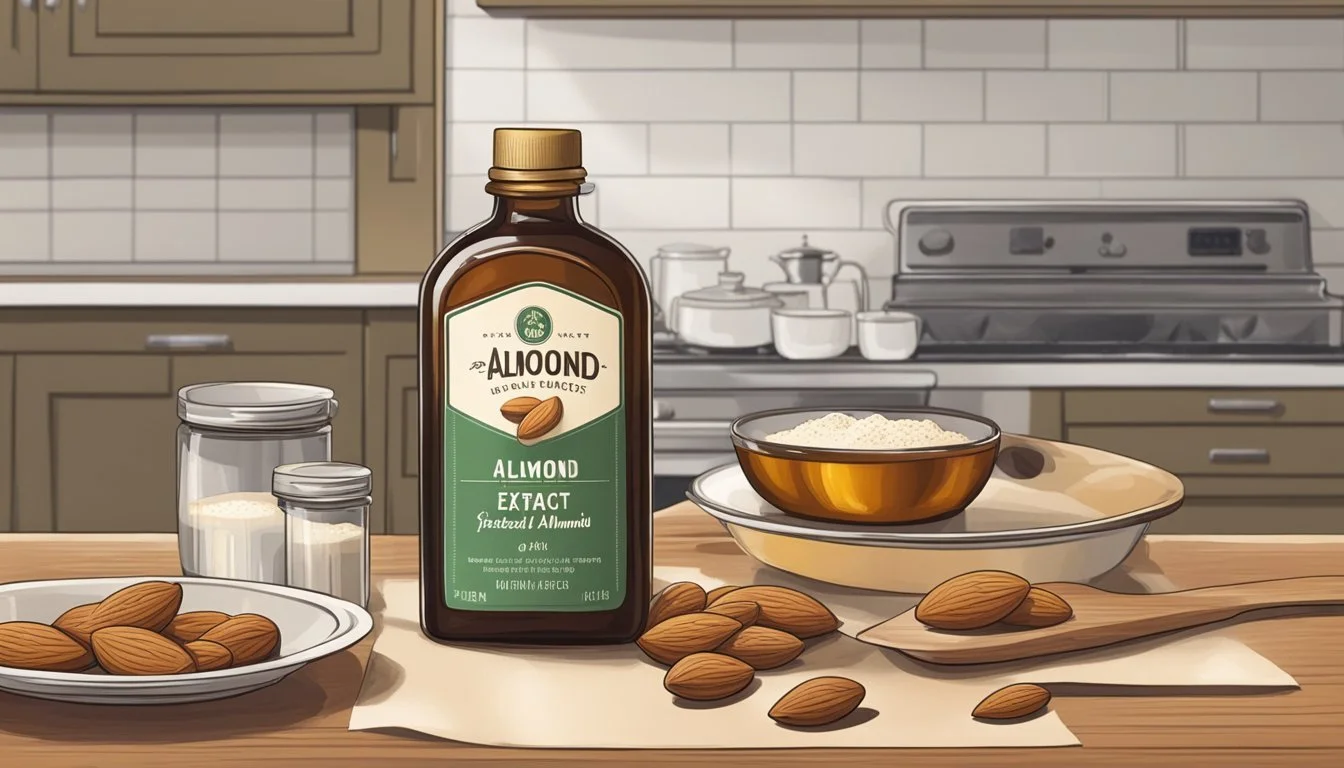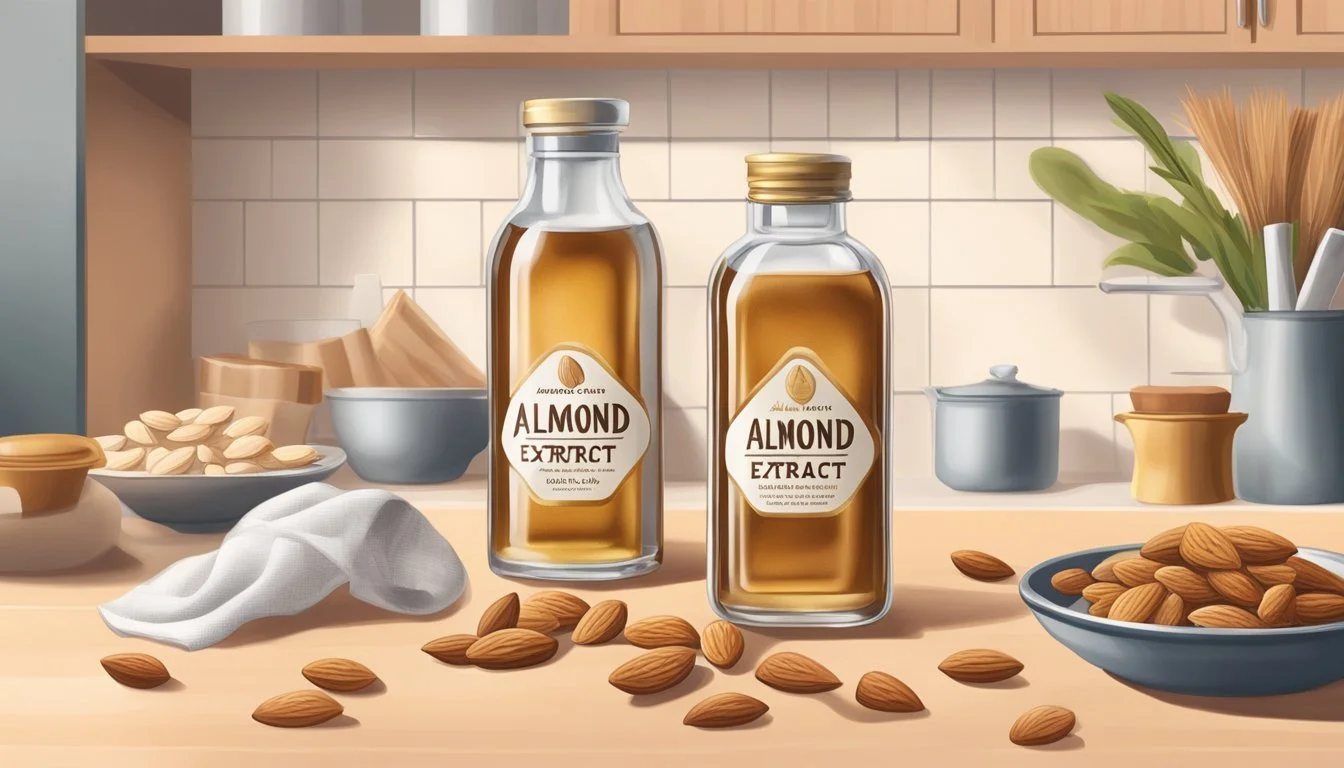Does Almond Extract Go Bad?
Shelf Life and Storage Tips
When it comes to enhancing the flavor of baked goods and desserts, almond extract is a popular choice. But does almond extract go bad, and if so, how long does it last? Almond extract does not go bad in the traditional sense but its flavor can deteriorate over time.
The shelf life of almond extract largely depends on its storage conditions. Properly stored in an airtight container, pure almond extract can retain its quality for several years. On the other hand, if the bottle is left open or improperly stored, the extract might lose its potency quicker, typically within a few months.
Consumers should pay attention to how the extract smells and tastes over time. If the flavor starts to weaken or it smells more like alcohol, it may be time to replace it. For the best taste experience, it's recommended to use almond extract within one to two years.
Understanding Almond Extract
Almond extract is a popular ingredient known for its strong, sweet flavor, commonly used in various culinary recipes. This section explores the composition and types of almond extract, its diverse culinary applications, and its nutritional profile.
Composition and Types
Almond extract is made by combining almond oil with alcohol. There are different types of almond extracts: pure, imitation, and homemade. Pure almond extract uses bitter almonds and can be toxic in high amounts. Imitation almond extract uses synthetic ingredients to mimic the flavor of almonds and is safe for those with nut allergies. Homemade almond extract typically uses unsalted almonds and vodka or other spirits as a base.
Culinary Uses
Almond extract adds a sweet, nutty flavor to various recipes. It is frequently used in baking to enhance the taste of cookies, cakes, and pastries. Chefs also use it in savory dishes to add a unique flavor twist. A small amount is sufficient for recipes, making it a strong flavoring agent. It’s also used in cocktails and desserts, providing a sweet aroma similar to vanilla extract.
Nutritional Profile
Almond extract is low in calories and does not offer significant nutritional benefits due to its small usage per recipe. It is often gluten-free and suitable for vegan diets. Pure almond extract is made from almonds, which contain healthy fats and proteins. However, due to the minimal quantities used, these benefits are not notable in the extract itself. Imitation extracts may have additives, so reading labels is essential.
Almond extract is an economical way to infuse the rich, sweet flavor of almonds into culinary creations, making it a staple for both baking and cooking.
Shelf Life and Storage
Almond extract, commonly used in baking and cooking, can maintain its quality for an extended period if stored correctly. Proper storage plays a critical role in preserving its aroma and potency.
Proper Storage Conditions
The shelf life of almond extract greatly depends on storage conditions. It is important to keep the bottle in a cool, dark place such as a pantry or cupboard. Exposure to heat, light, or air can cause the flavor to deteriorate.
Use an airtight container to prevent air and moisture from entering. Ensure the bottle is tightly sealed after each use. Avoid storing almond extract near stoves or windows where temperature fluctuations occur. The alcohol in the extract helps preserve it, but it still requires careful storage.
Signs of Spoilage
While almond extract doesn't spoil like perishable foods, its quality can diminish over time. Signs that the almond extract has gone bad include a rancid smell or a change in appearance.
If it has a strong alcohol smell or seems off, it’s best to dispose of it. Discoloration can also indicate spoilage. Check for any unusual sediments or cloudiness. Although it's rare, the presence of mold indicates the extract should not be used. It’s important to inspect the extract periodically for these signs.
Extending Shelf Life
To maximize the shelf life, store almond extract away from direct sunlight and extreme temperatures. Keeping the bottle tightly sealed will protect it from air and moisture. Using an airtight container adds an extra layer of protection.
For longer storage, some might consider freezing almond extract. However, this isn’t generally necessary due to the alcohol content. If freezing is chosen, ensure the extract is thawed slowly to avoid condensation, which can affect potency. Following these storage tips will help maintain the quality of the almond extract for several years.
Replacements and Alternatives
When almond extract goes bad or is unavailable, there are various options for replacing it. It is important to know when to replace almond extract and what suitable substitutes can be used.
When to Replace Almond Extract
Replace almond extract when it loses its distinctive almond scent or starts smelling like alcohol. This change usually indicates that it has gone bad. When stored properly, an airtight container can extend its life up to 4 years. If using almond extract from alternative brands such as Simply Organic, ensure they are within the use-by date for best results.
Signs of spoilage include:
Loss of almond aroma
Alcohol-like smell
Evaporation
Changes in the extract’s appearance or odor are good indicators that it's time to consider a replacement.
Suitable Substitutes
When almond extract is not an option, several substitutes can be used depending on the recipe. Vanilla extract is a popular replacement, offering a sweet and familiar flavor profile. Use an equivalent amount to replace almond extract.
Other substitutes include:
Walnut extract: Provides a nutty taste similar to almond.
Orange zest: 1/2 to 1 teaspoon can substitute 1 teaspoon of almond extract.
Almond oil: Adds a subtle, nuanced flavor.
For those interested in homemade alternatives, almond paste can enrich baked goods like cookies and tarts. Adjust measurements based on texture and flavor intensity needed.
Usage Tips and Tricks
To get the most out of your almond extract, ensure you use it within its shelf life, store it properly, and explore creative culinary applications.
Maximizing Flavor
Almond extract can enhance both sweet and savory dishes.
For the best flavor:
Use within 2 years: After two years, the flavor may deteriorate.
Add extract at the end: To preserve its potent flavor, add almond extract at the end of cooking or baking.
Small amounts: Since it is very concentrated, start with small amounts, adjusting to taste.
Combine flavors: Pair almond extract with vanilla or citrus extracts for added complexity in recipes.
Storage Best Practices
Proper storage is crucial for maintaining the quality of almond extract.
Key storage tips:
Airtight container: Keep the bottle sealed tightly to prevent evaporation and oxidation.
Cool, dark place: Store in a cool, dark area, away from sunlight and heat, to extend shelf life.
Avoid humidity: Humidity can affect the extract’s quality, so ensure it’s stored in a dry environment.
Check expiration date: While it can last 3-4 years, its flavor is best within two years.
Creative Culinary Ideas
Almond extract isn’t just for desserts – it has a variety of uses.
In baking:
Cakes and pastries: Add a few drops to cakes, cookies, or pastries for a nutty boost.
Desserts: Enhance puddings, ice creams, and custards with a rich, almond undertone.
In cooking:
Savory recipes: Use in marinades or sauces for a subtle, sweet nuance.
In beverages:
Cocktails: Add a drop to cocktails for an exquisite twist on traditional flavors.
Coffee: Infuse your coffee with a hint of almond for a unique taste experience.
With these tips, you can ensure that your almond extract remains a versatile and flavorful addition to your kitchen.
Safety Considerations
When dealing with almond extract, it is vital to understand the implications of using an expired product and be aware of potential allergenic reactions. Proper handling of expired almond extract ensures safety, while allergen information caters to individuals with specific dietary concerns.
Handling Expired Almond Extract
Expired almond extract may not be harmful, but its flavor could be significantly diminished. Exposure to air can cause the extract to evaporate or spoil faster. If the extract smells like alcohol or has an off odor, it is best to discard it.
Tips for Handling:
Store in an airtight container.
Keep it in a cool, dark place.
Discard if it smells off or has changed color.
Even though almond extract can last indefinitely when stored properly, always check for these signs to ensure its safety in recipes.
Allergen Information
Almond extract is derived from bitter almonds and may cause reactions in individuals with nut allergies. Those with nut allergies should avoid almond extract altogether and opt for alternatives if needed. Additionally, it is important to note that almond extract is typically gluten-free and vegan, making it suitable for certain dietary restrictions.
Key Allergens:
Nut Allergy: Risk of allergic reaction due to almond content.
Gluten-Free: Safe for those with gluten intolerance.
Vegan: Contains no animal products.
Examining the ingredient list and consulting with a healthcare provider can help determine if almond extract is safe for use.
Labeling and Dating
Proper labeling and dating of almond extract are crucial for maintaining its quality and tracking its freshness. Clear labeling helps identify the product's shelf life, while noting the date of opening aids in ensuring flavor preservation.
Understanding Expiration Dates
Expiration dates on almond extract bottles indicate the period during which the product is expected to retain its best quality. Manufacturers often use alcohol as a preservative, which can help maintain flavor for up to a year if the bottle remains unopened.
Once opened, almond extract should be properly sealed to prevent evaporation and loss of potency. While it may not spoil in the traditional sense, its intense flavor can diminish over time.
Labeling the bottle with its expiration date can serve as a useful reminder for users. Always store almond extract in a cool, dark place to extend its shelf life.
Tracking Freshness
Tracking the freshness of almond extract involves marking the container with the date it was first opened. This practice can help users determine how long the extract has been in use and assess its quality over time.
A simple way to do this is by using a permanent marker to write the opening date directly on the bottle. Another option is applying a small adhesive label where the date can be recorded.
Regularly checking the smell and flavor can provide additional insights into whether the extract is still good to use. An unpleasant or alcohol-like smell often indicates that the extract is losing its potency and may not provide the desired flavor in recipes.
Choosing to date and track almond extract ensures users can enjoy its rich, natural flavor for as long as possible.




